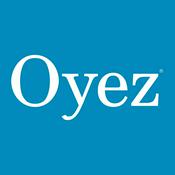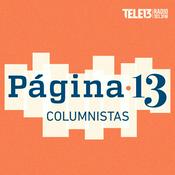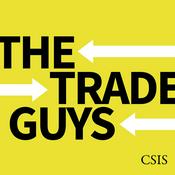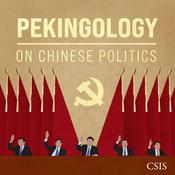Available Episodes
5 of 54
- #46 Expanding social security delivery to informal workersIn this episode, we conclude the building block of delivery and provision of social protection from our social protection solar system. After discussing the role of informal workers’ organizations in the delivery of childcare and healthcare, in this third and final episode of the series, we will talk about the role of informal workers organizations in the delivery of social security benefit for workers in the informal economy. In Costa Rica, an innovative approach to social security has been implemented over the years by the national government to include rural workers and, more recently, informal urban workers. In this policy, grassroots workers’ organizations play a key role not only in the last mile delivery, but in several stages of the delivery chain. To learn more how Collective Social Insurance Agreements work in Costa Rica, their challenges and potential for expansion and replication, I talked to Fabio Durán. Fabio is an economist and served as Head of the Public Finance, Actuarial and Statistics Unit at ILO’s Social Protection Department in Geneva, and has just retired as the ILO’s senior specialist in Social Protection and Economic Development for Central America and Mexico, in their office in Costa Rica. Learn more: *ILO Social Protection in Action Brief (2022). “Costa Rica: Extending mandatory contributory coverage to self-employed workers” https://www.social-protection.org/gimi/Media.action;jsessionid=f0DRZHXKIdUdf6eojX2c2lHKIAjQ_ly9Vx3-0XTMVPqdPICPNIgp!1393577045?id=19457#:~:text=These%20agreements%20are%20signed%20by,and%20medium%2D%20scale%20farmers%CA%BC%20organizations *ILO Report (2013) – “Innovations in extending social insurance coverage to independent workers” https://www.social-protection.org/gimi/gess/gess/RessourcePDF.action?ressource.ressourceId=42119--------26:28
- #45 Workers-led delivery of Healthcare and Social ProtectionIn this episode, we resume the building block of our social protection solar system on the topic of delivery and provision of social protection. In this second episode of the series, we will turn to India, to understand how informal workers organizations can play an important role to improve access to their members by facilitating the last mile delivery of services or benefits. The Self-Employed Women’s Association, SEWA, set up in India their so-called Shakti Kendras, or SSKs. I talked to Susan Thomas, the National Coordinator of Health and Childcare programmes at the Lok Swas-thya SEWA Trust (LSST), to learn more about this worker-led initiative. Susan explained how the Shakti Kendras operates, how they help informal workers to access social protection in India, how digital tools are being integrated in their work, as well as the next steps of the Shakti Kendras. *** Learn more: -BLOG: Bridges to Better Lives: SEWA’s Community Health Workers (October 05, 2019), by Annie Devenish, Laura Alfers https://www.wiego.org/blog/bridges-better-lives-sewas-community-health-workers/ -We are the bridge’: an implementation research study of SEWA Shakti Kendras to improve community engagement in publicly funded health insurance in Gujarat, India (2022), by Susan Thomas, Sharmada Sivaram, Zubin Shroff, Ajay Mahal, Sapna Desai https://gh.bmj.com/content/7/Suppl_6/e008888 -BLOG: In India, One-stop Shops Increase Access to Healthcare, Nutrition and Social Security Services for Working Poor (May 15, 2017), by Laura Alfers https://www.wiego.org/blog/india-one-stop-shops-increase-access-healthcare-nutrition-and-social-security-services-working/ *Our theme music is Focus from AA Aalto (Creative Commons)--------23:00
- #44 Towards a social insurance levy on capitalIn this episode we take a pause from the discussion around delivery and provision of social protection benefits and take a fresh look at the challenges to finance social protection in a time of very deep transformations in the world of work. Among these changes, we have increasing automation, swift advances in artificial intelligence and the emergence of forms of capital-labour relations through the mediation of platforms. These multiple processes have triggered an intense discussion about how social protection systems should be or could be financed – and by whom. It was within this ongoing debate that Luca Pelerano and Florian Juergens-Grant have recently published an op-ed at Project Syndicate. In this article, they analysed some of these challenges and, most importantly, advanced some possible innovative alternatives to address them. Luca and Florian will be our guests in this special episode. Luca Pelerano is a social protection specialist and works at the Social Protection Department of the International Labour Organization (ILO) and he has more than 15 years of experience in policy reform. Florian is the Global Social Protection Advisor at WIEGO, and his work focuses mainly on the issues regarding the financing of social protection for informal workers, the impacts of social protection programmes on labour markets, workers and their families; as well as the design of inclusive social insurance systems. *** Learn more Future-Proofing Social Protection, by Luca Pelerano and Florian Juergens-Grant - https://www.project-syndicate.org/commentary/how-to-ensure-sustainable-financing-social-insurance-by-florian-juergens-grant-and-luca-pellerano-2025-03s--------32:51
- #43 Workers-led Delivery of Child Care in MarketsIn this episode, we start a new building block of our social protection solar system with the first part of the topic on delivery and provision of social protection. We will be looking at the innovations in the delivery of services and cash grants, focusing on informal workers and on the role that informal workers organizations might have in improving access to these workers by facilitating the last mile delivery of services or benefits. To open this block, we will turn to Africa and look into three cases of provision of child care services. First, we go to South Africa, to talk to Richard Dobson about the pop-up child care facility in the Warwick Junction market, in Durban. Richard is an architect and co-founder of the NGO Asiye eTafuleni. Next, we move to Accra, in Ghana, to talk to Dorcas Ansah, WIEGO’s Accra Focal city coordinator. We discussed the guidelines for implementing child care facilities in the Ghanaian capital markets and the plans for expanding the initiative. We finish our tour in Rwanda, where the market vendors association SITRIECY is also implementing child care facilities in the Kigali markets. We talked to SITRIECY’s secretary-general and StreetNet International treasurer Jeanette Nyiramassengesho. She explained their approach to combine provision of child care for informal workers’ children in markets with the creation of a community savings group. *** Learn more - WIEGO: Child Care in Markets: An E-Book https://www.wiego.org/research-library-publications/child-care-in-markets/ - Working in Warwick: Including Street Traders in Urban Plans https://www.wiego.org/research-library-publications/working-warwick-including-street-traders-urban-plans/ - WIEGO - Child Care in Markets project: https://www.wiego.org/project/child-care-markets/ - Guidelines and Standards for Day-Care Centres in and around Markets in Ghana, by Susan Sabaa, Dela Quarshie-Twum https://www.wiego.org/advocacy-worker-education-resources/guidelines-and-standards-day-care-centres-and-around-markets-ghana/ - Webinar: https://www.youtube.com/watch?v=wn9niHLL8vI - About Asiye eTafuleni https://aet.org.za/about-asiye-etafuleni/our-story/--------34:22
- #42 Social Dialogue and Social Protection for Informal WorkersIn the fourth and last episode of the governance building block we dive into the discussion of social dialogue and social protection for informal workers. But what does social dialogue actually mean? How can in be used as a tool to improve social protection schemes to better include informal workers? What are the aspects we should look at when analysing these spaces and what are the main barriers workers in the informal employment face to access them? To help us understand these questions we invited two guests. First, we are going to talk to Jane Barrett, who will set the stage and introduce us to the main aspects of social dialogue, the power dynamics and how these spaces should work. Jane is the former Organization and Representation programme director at WIEGO. She has extensive experience in collective bargaining, membership recruitment and organizing, trade union membership and leadership education, research and policy advocacy. In the second part of the episode we talk to Aura Sevilla, who will talk about the concrete social dialogue experiences in Southeast Asia. Aura is the Southeast Asia focal point of the Social Protection programme at WIEGO. She has been working in a study report analysing six countries in the region: Brunei, Cambodia, Indonesia, Myanmar, the Philippines, and Thailand. *Our theme music is Focus from AA Aalto (Creative Commons) References Informal workers and dialogue for social protection, Social Protection Responses to COVID-19 #3, by Annie Devenish and Cyrus Afshar https://www.wiego.org/social-protection-responses-covid-19/ Social Dialogue for the Transition from the Informal to the Formal Economy, by Global Deal https://www.wiego.org/research-library-publications/social-dialogue-transition-informal-formal-economy/--------41:19
More Government podcasts
Trending Government podcasts
About Informal Economy Podcast: Social Protection
Globally, 2 billion people work in the informal economy. This means that 61% of workers rely on work that offers little pay and few protections. Women informal workers, such as domestic workers, home-based workers, street vendors and waste pickers are at the base of the economic pyramid with the highest risk of poverty. Public policies and social protection schemes often do not consider these workers, leaving them vulnerable to income losses and struggling to cope after an event or shock. In this monthly podcast we will discuss some of the most pressing issues related to social protection from the perspective of informal workers, including debates around the future of work, demographic changes and the informal economy, as well as social services, like child care and health that can protect informal workers’ incomes. Subscribe to the “Informal Economy Podcast: Social Protection” to learn more about WIEGO’s cutting-edge research and hear from informal workers organisations about the debates, policies, successes and challenges they face in accessing and reforming social protection systems.
Podcast websiteListen to Informal Economy Podcast: Social Protection, Disclosure and many other podcasts from around the world with the radio.net app
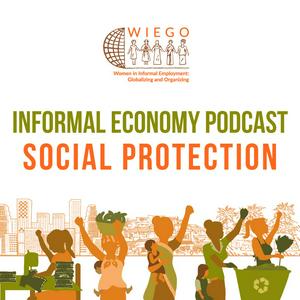
Get the free radio.net app
- Stations and podcasts to bookmark
- Stream via Wi-Fi or Bluetooth
- Supports Carplay & Android Auto
- Many other app features
Get the free radio.net app
- Stations and podcasts to bookmark
- Stream via Wi-Fi or Bluetooth
- Supports Carplay & Android Auto
- Many other app features


Informal Economy Podcast: Social Protection
Scan code,
download the app,
start listening.
download the app,
start listening.












